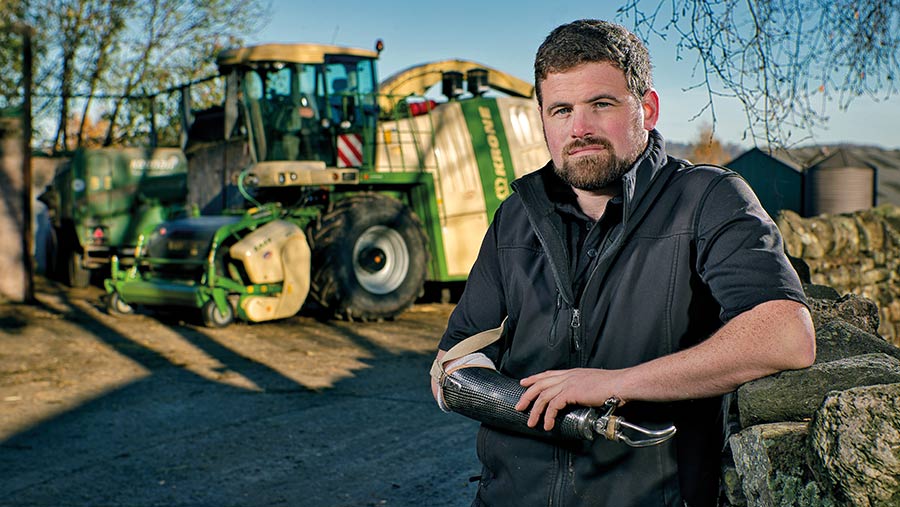Dying to Feed You Video: Ashley Herbert never felt pain like it
 © Richard Stanton
© Richard Stanton Cumbria farmer Ashley Herbert was 24 when he lost his hand in a farm machinery accident. After being rushed by air ambulance to hospital, surgeons managed to stem the blood pouring from his arm and operate on him successfully.
Ashley now manages with a prosthetic arm and while he says he can do everything he needs to, he admits it is hard.
Watch Ashley recount his story and read the rest of the story below.
See also: Dying to Feed You: 12-year-old William Sayers lost his arm
Videographer: Richard Stanton
It started off the same as any other sunny day. We were silaging and there were seven or eight trailers in the field waiting for me to get going.
I set the forager to run, but it came up with an error saying the sharpening stone door was still open.
When you’re driving a forager, the whole silaging operation depends on you. You’ve got to keep it running.
Hiring in trailers is expensive – you’ve got to keep them full of grass and moving. You can’t afford to have them standing still empty.
I opened the sharpening door and closed it again. I jumped back on but I still couldn’t get it to go.
I tried again with the same result. Then I jumped off without realising the drum was still running.
The forager was new to the farm. I’d only been on it two or three days prior.
I’d had a day’s training – but it was more about operating the machine than troubleshooting, so I was thinking on my feet.
See also: Dying to Feed You: 12-year-old William Sayers lost his arm
Sensor problems
The forager we had before had a lot of sensor problems – debris, grass, anything in front of the sensor would stop it running.
So I was looking around trying to find if there was a sensor on this door, too.
I put my arm over the guard and reached in. And that was it – my hand was gone. The first thing I felt was a draught from the blade.
But I’d already lost my hand because it happened so quick. The drum runs at 1200 RPM – so it’s just a massive mincer.
As soon as I realised what had happened, I was screaming. The blood was squirting everywhere.
My father-in-law grabbed me and wrestled me to the ground. Then my brother-in-law grabbed some baler twine for a tourniquet.
It was about 10 minutes before the air ambulance arrived. It seemed like the longest wait in the world.
Even though my arm was tourniqueted, the blood was still streaming out. I remember lying on the ground thinking “this is the end”.
Extraordinary pain
I’ve never felt pain like it. It started off very dull and then just grew and grew and grew. It was extraordinary.
They gave me ketamine to settle me. Then they put me on morphine and flew me to hospital.
I was rushed straight into theatre. All I had left of my right hand was a flap of palm skin. It meant I didn’t need a skin graft.
They just folded the skin over and sewed it up. The surgeon said I couldn’t have done a better job if I had tried.
I was in hospital for a week. Adapting to life afterwards has been hard. I was determined that I would be able to do everything I could do before the accident.
It hasn’t been easy and I couldn’t have managed without my girlfriend, Lizzie, who is now my wife.
After the accident, I wanted to do a fundraiser for the air ambulance. I was a keen cyclist before, so me and a friend decided to ride from Lands End to John O’Groats.
My local bike shop made a bike up for me with all the controls on the left-hand-side.
And my prosthetist adapted my prosthetic right arm so it could clamp to the handlebars. It opened up the world.
We did 970 miles in nine days. It was gruelling but everyone got behind us.
We raised £20,600 for the air ambulance. I sort of feel like I’ve paid for my flight now – and, hopefully, for others too.
My attitude to farm safety is to slow down. I was never a risk taker. It is too easy to rush or take a short cut.
But that short cut could lead to a nasty accident – or could even cost your life.
How to prevent machinery accidents
Prevention is always the goal. In relation to working with machinery, an employer should:
- Train staff on how to deal with problems and breakdowns
- Give clear information and confirm staff know how to conduct each type of fix safely
- Ensure machine is in safe stop: switched off and isolated
- Promote a good safety culture to reinforce the message that if it doesn’t feel safe to do it, then don’t do it
- Provide a co-worker.
Should an accident happen:
- It’s critical to have first aid training and the right kind of first aid kit for fast treatment until the professionals arrive
- Don’t let an employee return to work after an injury until their capabilities have been thoroughly assessed
- Ensure return to work is carefully managed and does not adversely affect recovery
- Provide ongoing support and monitor mental wellbeing.
Source: Safety Revolution
Dying to Feed You
 About the campaign
About the campaign
Farming has the highest number of workplace fatalities of all occupations. Farmers Weekly is pledging to use its voice, influence and reach to reduce the accident rate in agriculture.
Find out how you can be a part of helping us change agriculture’s safety record at fwi.co.uk/dying-to-feed-you
Partner message

The team at Safety Revolution are delighted to be working with Farmers Weekly to reduce deaths in agriculture and to show how we can work together to create safer farms.
Building strong and positive safety cultures delivers happy and safe teams, fewer incidents and improved productivity. We look forward to exploring individual case studies and shining a light
